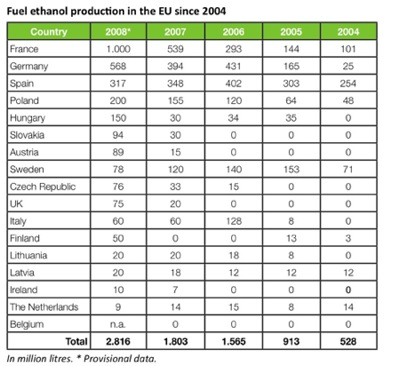After a rather moderate growth in 2007 (11%) European fuel ethanol production increased considerably in 2008. The strong growth of almost 60% came at a time where the EU legal framework for biofuels was under discussion and biofuels were under critique.
Total EU production in 2008 was an estimated 2.8 billion litres up from 1.8 billion litres the previous year. This represents a significant increase of 56%. Most of this increase is due to the growth in French production, which almost doubled to 1 billion litres in 2008 (up from 539 million litres in 2007). This makes France the biggest EU ethanol fuel producer in 2008, followed by Germany that also expanded their output to 568.5 million litres (+32.5%). Third biggest producing country was Spain with 317 million litres. In 5 out of 18 producing member states the production declined while the rest could either increase their production (12) or could keep it steady.
In 2008 fuel ethanol production capacity came on stream in Belgium. Finland resumed its production in 2008 and in Austria fuel ethanol has been produced for the first complete year. The total number of member states that produce bioethanol for the fuel sector increased to 17. 2008 was also a record year in terms of imports. Total imports increased by 400 million compared to 2007 and are estimated to have reached almost 1.9 billion litres in 2008. Between 1.4 and 1.5 billion litres came from Brazil only. Somewhat over 50% of all imports (around 1.1 billion litres) were used in the fuel sector.

It is still too early to publish reliable consumption data for 2008. eBIO will publish an update of production and imports data by July 2008. By then also consumption and feedstock data will be published.
Source
"European Bioethanol Fuels Association (eBio)"[www.ebio.org, press release, 2009-04-02.
Supplier
European Bioethanol Fuel Association (eBIO)
Share
Renewable Carbon News – Daily Newsletter
Subscribe to our daily email newsletter – the world's leading newsletter on renewable materials and chemicals









